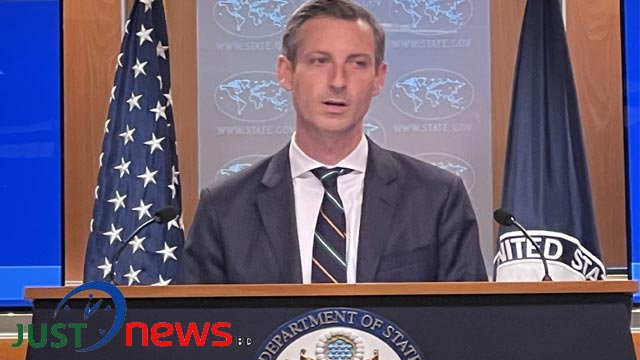M Mushfiqul Fazal, State Department Correspondent
State Department spokesperson Ned Price has said as part of US partnership with Bangladesh they are in a position to raise a number of issues, a number of shared interests, but also concerns.
“We regularly raise human rights issues with the Government of Bangladesh. We do that publicly, as I’ve done before, but we also do it privately. We urge for the strengthening of democratic processes and political institutions, the rule of law, protection of human rights and fundamental freedoms, workers’ rights and safety, and the protection of refugees as well,” Ned Price said this at briefing on Thursday in reply to a question on Bangladesh issue.
State Department correspondent Mushfiqul Fazal asked,, “On Bangladesh, Bangladesh Foreign Minister Dr. Momen provided a list of questions to the Bangladeshi-controlled media reporters to ask the U.S. ambassador in Bangladesh. In an open statement, he said nearly 100,000 U.S. citizens go missing, extrajudicial killing going on in the U.S. as U.S. security forces have killed over a thousand citizen – mostly African American and Hispanic – each year, America do not have the faith in their election process, and he also criticized the blocking Russian media, RT TV, here in the U.S.
Foreign minister circulated this message a day after the U.S. Ambassador to Bangladesh Peter Haas spoke on the U.S. priorities of human rights, democracy, and media freedom, and he said that they want free and fair elections in Bangladesh. What you would say about this authoritarian regime foreign minister remarks? And one more on Bangladesh.”
In reply Ned Price said, “Well, we have a robust partnership with Bangladesh. As part of that partnership, we’re in a position to raise a number of issues, a number of shared interests, but also concerns. And we do regularly raise human rights issues with the Government of Bangladesh. We do that publicly, as I’ve done before, but we also do it privately. We urge for the strengthening of democratic processes and political institutions, the rule of law, protection of human rights and fundamental freedoms, workers’ rights and safety, and the protection of refugees as well.”
“We have worked with the Government of Bangladesh to strengthen these rights and protections. We have provided more than $8 billion in assistance to Bangladesh since its independence. In 2021 alone, USAID provided over $300 million to improve the lives of people in Bangladesh through programs that expand food security, economic opportunity; improve health and education; but also promote democracy and good governance, as well as protection for the environment and increased resilience to climate change.So we’ll continue to have those conversations with our Bangladeshi partners.”
In another question the corresponding asked, “One more on Bangladesh. Countrywide protest going on against Prime Minister Sheikh Hasina for her recent remarks on dropping opposition leader and former Prime Minister Khaleda Zia and the microcredit pioneer – Nobel Laureate Professor Muhammad Yunus into the river from Padma Bridge. She claimed that Muhammad Yunus uses U.S. influence to stop the World Bank funding for the bridge construction, so they should punish – get punishment like this. She wants to drop them from the Padma Bridge to the river – into the river. See, she openly remarks, and countrywide protest going on. And ruling party (inaudible) alongside of the law enforcers agency the attacking of the peaceful demonstration. So what is your comment on this?”
In reply State Department spokesperson said, “As we do around the world, our comment is that the freedom of assembly, freedom of expression, the right of individuals everywhere to protest peacefully – that is a universal right. It applies equally to the people of Bangladesh as it does to those anywhere around the world. We call on governments around the world, we call on security services, security forces, civil forces as well to respect that right, to allow for individuals to assemble peacefully to make their voices heard.”
NL/





